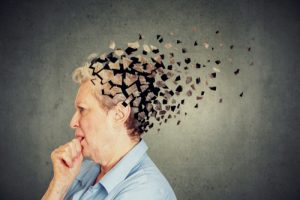It’s been long known that estrogen plays a huge role in the health of women. Recent studies have determined that it can even protect women from Alzheimer’s disease.
Postmenopausal women are more likely to develop the disease as the drop in estrogen levels can affect the brain. A research study described below explores the key relationship between estrogen and the brain and how women who have estrogen exposure later in life may be better protected against Alzheimer’s disease.
What Effect Does Estrogen Have on Women?
The study was conducted by researchers from Weill Cornell Medicine and New York-Presbyterian. Their findings were recently published in the Neurology publication. The study examined the MRI scans and cognitive testing of 99 women ranging in age from late 40s to late 50s, the age range that menopause takes place. What the researchers found was confirmation of their belief that there was a direct link between menopause and less gray matter in the brain in areas that made women more susceptible to Alzheimer’s disease.
However, the researchers also determined that women who have an exposure to estrogen after menopause are better protected against the disease. They also determined that women with higher exposures whether they reached menopause later, had more children, used hormonal birth control or used hormone therapy during menopause had more gray matter volume in those areas of their brains.
What Happens to the Brain with Alzheimer’s?
While women with better, longer exposure are more protected from Alzheimer’s disease, especially when they have had more children or been on hormone therapy, it’s important to know what happens when the opposite is the case.

Estrogen is known to be a protective agent for the female brain. In addition to protecting the brain and controlling behavior, the sex hormone also protects the central nervous system. Of course, due to menopause, that doesn’t last forever. When the hormone steeply declines as women enter menopause, it adversely affects portions of the brain that are prone to Alzheimer’s. However, if women have greater exposure to estrogen, it could counteract that effect and keep the brain stronger and prevent the disease from having a chance to develop. Hormone replacement therapy could serve as a significant means of protection for women who are already in menopause to reduce the risk of Alzheimer’s and dementia.
Researchers also determined that overall, Alzheimer’s affects women more than it does men. The steep drop in the sex hormone is believed to be the reason. The researchers stated that they want to find a way to reduce women’s risks heading into the future.
What Can Be Done in the Future?
The researchers conducted an analysis and examined the findings of the brains of the 99 women and compared them with the brains of 29 men who ranged in similar ages of 46 to 58. They looked at the functions of the brains of these two groups as well as the brains of women who were pre-menopausal and noted that women who were postmenopausal and perimenopausal had lower amounts of gray matter volume. Areas of the brain that were affected include the hippocampus, temporal lobe regions and entorhinal cortex, all of which are typically impacted by Alzheimer’s disease.
The study learned that women who enjoyed a longer reproductive life have more gray matter volume in areas at the top of the brain and left hemisphere. Meanwhile, it was also found that women who have received hormone replacement therapy are better protected in the frontal gyrus and other areas of the brain that are known to be affected by Alzheimer’s disease.
The researchers want to get a better understanding of why Alzheimer’s affects women more than men. Because they aim to reduce women’s risks of Alzheimer’s disease by treating them with hormone therapy, they explored the option of women taking estrogen hormone therapy between 50 and 63 years of age and saw that they benefited from being protected. However, in those older than 64, there was no notable benefit.
Women can fight their Alzheimer’s risk when they get more exposure to estrogen. It might be worth discussing this issue with your doctor.





